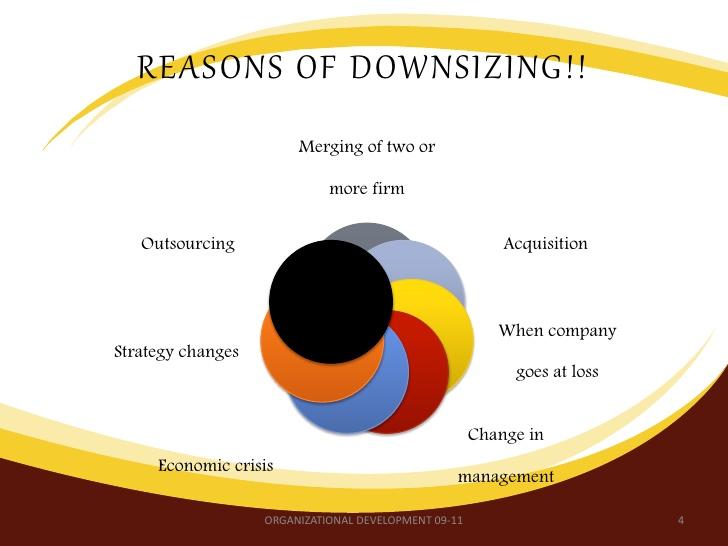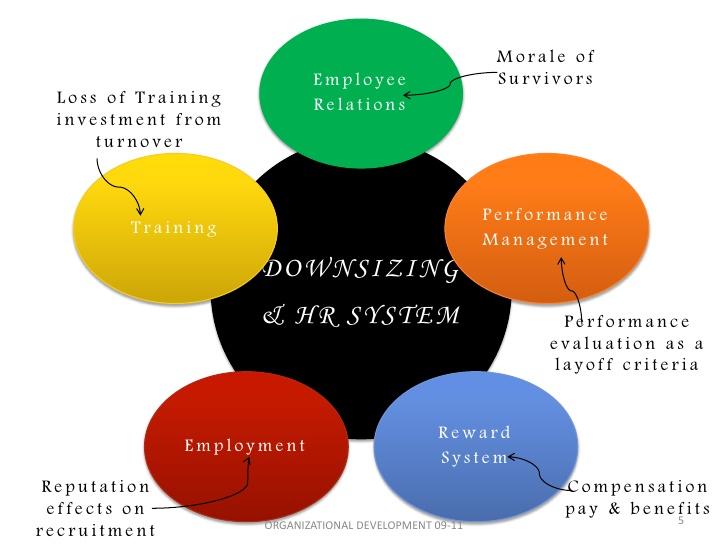Introduction
After a period of successful operations, situations occur when organizations need to reduce their operational costs to remain profitable. As a result, downsizing becomes inevitable. It entails reducing the size of a business to retain operational costs that the business can sustain. As this paper reveals, firms downsize to enhance their efficiency, productivity, and competitiveness. However, such a move influences employees, communities, and business operations.
Why Firms Downsize
York (2009) defines downsizing as an irrevocable cutback of an organization’s workforce. The management unit makes and implements downsizing plans to increase a company’s effectiveness, competitiveness, and yield. Indeed, some strategic resolutions, including mergers and acquisitions, are adopted to allow an organization to acquire a competitive advantage in today’s changing business world (Iverson & Zatzick, 2011). Such decisions are always accompanied by discussions about the appropriate business size. Downsizing constitutes a foreseeable dominant theme in such deliberations. Figure 1 below shows some of the possible reasons that lead to reducing the number of workers.

In the current competitive market, York (2009) argues that firms are under substantial pressure to cut their cost of operation to improve their efficiency. As such, many businesses are currently automating their systems. Hence, they are forced to downsize their workforce after adopting emerging technologies that take the place of many employees. Here, technological changes are depicted as signals that call for organizational downsizing. Indeed, such transformations occur, especially where the suggested technology has the potential of increasing business output while employing a few people. Pressing issues driven by the perspective that smaller organizations are better about larger ones may also lead to downsizing decisions. Also, companies downsize to enhance their operations even during financially trying moments. York (2009) agrees with this assertion by adding that such a move helps to relatively prevent bankruptcy while proactively increasing business productivity and chances of survival. Downsizing entails a response to acquisitions, mergers, a reduction in the market share, and unsatisfactory revenue.
Consequences of Downsizing to a Community
A healthy economy can compensate workers who lose jobs by giving them new ones. However, in case the rate of mass lay-offs following the downsizing of many firms exceeds the number of newly opened companies, the move to reduce the size of the available workforce is said to produce negative economic effects on communities within a nation. One lost job becomes a predicament whereby families are forced to cut spending following the reduction of gross household income levels. This situation decreases consumers’ purchasing potential. Thus, the government earns less income from taxes. For example, when mass lay-offs occur within a country because of downsizing endeavors by companies, a car manufacturer anticipates making minimal sales. Consequently, this state of affairs leads to fewer job opportunities recorded in corporations that supply car parts.
In other words, the net effect of downsizing is a decrement of the purchasing power of all people within communities where laid-off employees live. The resulting reduced tax collection implies that governments have minimal funds to spend in the supply of public goods that are critical in enhancing communities’ living standards. Considering the negative ripple effect of downsizing in communities, organizations need to consider other alternatives. York (2009) identifies these options as overtime cutbacks, retraining, remuneration decrement, the freezing of employee enrollment efforts, and job-sharing among others.
Example of an Employer/Organization where Downsizing was Necessary
The merger between Westpac Corporation and St. George Bank came when the two businesses were performing very well. Westpac Corporation was regarded as one of the best financial institutions in Australia while St. George Bank had built its special niche as a family-centered financial institution (Al Jerjawi, 2015). The merger of the two institutions resulted in a huge company with a massive capacity to meet the demands of the market in various segments of the finance industry (Al Jerjawi, 2015). After the amalgamation of Westpac Corporation and St. George Bank, issues of rightsizing emerged. The two entities operated separately. However, they had to operate as a unit. Bearing in mind that they were in the same line of business, the possibility of duplicating duties and overlaps was inevitable. The management of this new business had to find a way of rightsizing the human resource to not only increase efficiency but also cut operational costs. It had to determine if there was any need for downsizing the number of employees.
Rightsizing is the joining of Westpac Corporation and St. George Bank was a delicate process that needed substantial management intelligence. The two sets of employees tried to prove their superiority levels (Al Jerjawi, 2015). Nevertheless, this experience was not new. Iverson and Zatzick (2011) observe that great care should be taken when executing the rightsizing process since some employees may feel intimidated in case one of the two merging firms is a major stakeholder. They may need protection against workers from the larger firm who not only feel superior but also demand favors. In the merger between Westpac Corporation and St. George Bank, the management had to find a way of balancing the two divides in a manner that after downsizing, the remaining number of employees felt appreciated and valued within the new firm.
Impact on Employees and Business
The amalgamation of Westpac Corporation and St. George Bank led to a survival syndrome. According to York (2009), when a firm retrenches some of its employees, workers who are retained develop some form of apprehension, owing to the possible lack of job security. This situation impairs their performance within the firm. Downsizing affects employees psychologically. They are subjected to a situation of imagining what their fate would be in the future (Iverson & Zatzick, 2011). They start thinking about how they would survive when their turn to be retrenched comes. As a result, they demonstrate some withdrawal signs.
The business of an organization also experiences unprecedented impacts. While downsizing aims at increasing companies’ productivity and efficiency, this goal may not be achieved. According to York (2009), a downsized organization may be unprofitable and non-efficient in some situations, hence interfering with the process of product development. Reducing the number of employees increases labor turnover. Further, low productivity levels are associated with a deteriorated organizational commitment by employees who remain in a company. York (2009) presents downsizing as an alienating experience whereby staff members who are left behind feel dejected and anxious. Consequently, businesses record poor organizational performance because it is directly related to employees’ dedication to work and job security. The above information may be summarized in Figure 2 below.

Conclusion
Organizations reduce their workforce to increase productivity and reduce the cost of operation. Nevertheless, this goal may not be realized in all situations. The survival syndrome associated with downsizing may translate into reduced work commitment and motivation among the remaining employees. Therefore, even though management teams need to consider efficiency, productivity, and cost-reduction concerns in their downsizing decisions, it is important to factor in the ripple effect of such resolutions. In other words, instead of retrenching employees, such teams may take into account other options that can help in managing operational costs effectively, including retraining, job sharing, and the reduction of overtime.
References
Al Jerjawi, K. (2015). The role of human resource executives in mergers: A comparative case study of two bank mergers, the merger of Westpac Corporation and St. George Bank (Australia) and the merger of Emirates Bank International and the National Bank of Dubai (UAE). Web.
Iverson, R., & Zatzick, C. (2011). The effects of downsizing on labor productivity: The value of showing consideration for employees’ morale and welfare in high-performance work systems. Human Resource Management, 50(1), 29-44.
York, K. (2009). Applied human resource management: Strategic issues and experiential exercises. London, England: Sage Publications.